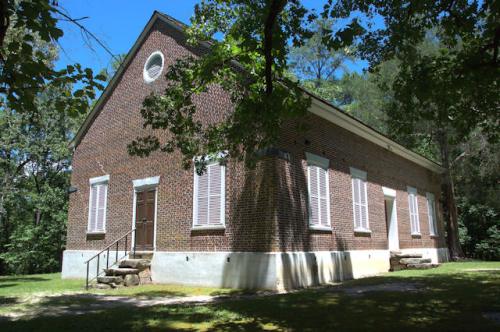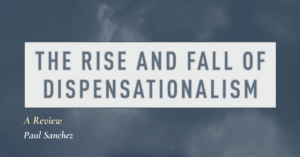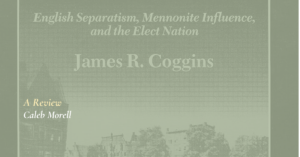Introduction
Samuel Cartledge may be one of the most important figures in Georgia Baptist history, and yet he is easily one of the most overlooked. It is my prayer that by God’s grace, this article will introduce him to you. For the few that know of Cartledge, I will more fully flesh him out as more than the footnote that he has been relegated to.[1]
Daniel Marshall, Pioneer Baptist
Before we learn about Samuel Cartledge, we must go back to a more well-known figure in Georgia Baptist history, Daniel Marshall. Marshall is recognized as the pioneer Baptist evangelist, preacher, and church planter in Georgia. He was born in Windsor, Connecticut in 1706. At 20 years old, Marshall was converted and joined a Presbyterian church but later came to Baptist convictions and requested baptism by immersion.[2] Marshall quickly threw himself into the gospel ministry by preaching and planting churches. He spent nearly two years evangelizing the Mohawks until he was prevented by the spread of the “Indian Wars” across the colonies.[3]
Daniel Marshall’s brother-in-law, Shubal Sterns, was converted under the preaching of George Whitfield in 1745.[4] Stearns was so impassioned by his conversion experience that he would go on to partner with Daniel and others to supply the Sandy Creek Association of Baptist churches with faithful preachers of the gospel. Daniel Marshall’s preaching, along with Sterns’ leadership, has been credited with carrying the Great Awakening to the South.[5] His son, Abraham Marshall, would later join his father in the gospel ministry and become a noteworthy preacher himself.
There is more than enough evidence to demonstrate that Daniel Marshall’s evangelical, Baptistic, and yes, Calvinistic theological convictions fueled his evangelism.[6] The Philadelphia Association of Baptist Churches sent a pastor named Benjamin Miller to examine Marshall about his theological convictions. Miller came away satisfied that Marshall’s theology was consistent with the 1742 Philadelphia Confession of Faith which was adapted from the Second London Confession of 1689. He commented that Marshall and Stearns were “warm-hearted Christians” and he “would not take gold for them.”[7]
Migration to Georgia
In the mid to late eighteenth century, what is now the State of Georgia was a British colony. Any kind of meaningful religious freedom was still years away from becoming a reality. When Daniel Marshall crossed the border from South Carolina into Georgia he knew the risk he was taking. His preaching as a Baptist was in violation of the officially recognized Anglican Church of England. Marshall and the Baptists had become so successful that Anglican ministers were urged by the government to target their efforts to specific areas in order to combat “those Baptist vagrants.”[8]
In 1771, just five years before the Declaration of Independence was to be signed, Daniel Marshall was continuing to preach repentance and faith in Christ in the Georgian colony without permission from the Church of England. He planted many churches, including Kiokee Baptist Church which remains today as the oldest continuing Baptist church in Georgia. One day, while kneeling in prayer, Marshall felt the hand of a 21-year-old constable on his shoulder.
Samuel Cartledge, “Stern Constable”
The constable who took Daniel Marshall into custody was named Samuel Cartledge. His great-grandfather, Edmund Cartledge, had been part of the first Quaker settlements in Pennsylvania. Samuel’s father, also named Edmund, moved to North Carolina where he abandoned Quakerism for the Anglican church.[9] In 1743 Edmund married an Anglican woman named Elizabeth Keble. Samuel Cartledge was born near what is now Rockingham, North Carolina on July 15, 1750.[10]
We can imagine what may have motivated Samuel Cartledge to confront Daniel Marshall and announce to the Baptist evangelist, “You are my prisoner.”[11] Was he an overzealous young man who saw himself doing God’s work by quelling a disruptive influence in the colonies? Was he reluctantly obeying his superiors, possibly his own father, by following direct orders to arrest a man who he believed to be honorable? He was reported to have a modest education in English and some training as a shoemaker.[12] His father Edmund was apparently well regarded enough to serve as a justice of the peace, which may have empowered him to deputize his own sons as constables.[13]
Regardless of any internal resolve or conflict in Samuel Cartledge’s heart, we know from the historical record that Daniel Marshall was ordered to answer charges. He was accused of violating a 1758 enactment which prohibited any form of worship in the colony not in accordance with “the rites and ceremonies of the Church of England.”[14]
Following his arrest by Samuel Cartledge, Daniel Marshall was ordered to give security and appear before a magistrate in Augusta the following Monday. Like Martin Luther before him, Marshall was being forced to defend his personal convictions. To be fair, Anglican opposition to Baptists was not the same as Rome’s opposition to the Reformers. But at the same time, both Luther and Marshall were granted time to wrestle with fundamental questions about where ultimate authority resides in a public sphere. A type of trial and conviction would follow, but not in the way that anyone could have predicted.
Faith on Trial
Following his arrest, Daniel Marshall was forced to appear before authorities with the Church of England. The magistrate has been identified as a certain Col. Barnard (or possibly Barnet). The magistrate grilled Marshall about his knowledge of the Bible and the legitimacy of his preaching. Marshall’s wife spoke up and boldly came to her husband’s defense, condemning the proceedings and fluently quoting Scripture.[15] The magistrate ordered Marshall to cease his preaching. Marshall responded by quoting the apostles’ words from Acts 4:19, “Whether it be right to obey God rather than men, judge ye.”[16]
Samuel Cartledge was so moved by Mrs. Marshall’s words that he himself was cut to the heart and converted.[17] Five years later, Cartledge, the same man who arrested Daniel Marshall found himself being baptized by his former prisoner. Not long after that, Cartledge began serving as a deacon at Kiokee Baptist Church, the same church his former prisoner had planted. He attended the constitution of Fishing Creek Church in 1783 and the Georgia Association of 1785. In 1789 he began preaching and was ordained by Daniel Marshall’s son, Abraham.[18] Samuel Cartledge went on to serve in the preaching ministry for the next 50 years of his life. God used Daniel Marshall and his family as the means to grant Samuel Cartledge the new birth, baptism as a believer, and place him on the path to ordination into the gospel ministry.
We have very little in the way of writings from Samuel Cartledge, but his grandson later recounted some of his sermons. As a Separate Baptist, his preaching style has been described as both warm and able to “cut to the heart”, consistent with the Puritan tradition.[19] In one message, Samuel would tell the story of a soldier in the Revolutionary War who constantly bragged about what he would do when the time came to fight. Sure enough, his company was called up to battle and this man was the first to run away. He climbed over a fence to escape. He was carrying a large ashpone (cornbread baked in the coals of a campfire), which came out of his coat pocket and got caught up on the fence. The man came down on the other side of the fence and the heavy ashpone fell on top of his head. The fleeing soldier cried out, “Sir, I surrender!” This man thought he was under attack from the enemy but was really just surrendering to a hunk of his own cornbread! Samuel would wait for the laughter to die down before telling the congregation, “Ah, my brethren, this is too much the way with some of us. We have great confidence in our own strength; but when Satan assails us with his temptations, we are the first to yield. O, let us never forget, that in God, is our strength!”[20]
Samuel Cartledge would go to pastor Plum Branch Church for almost fifty years. He affirmed the doctrines of Christ’s sufficiency, man’s depravity, the reality of Satan, and the call to a life of holiness. His wife Elizabeth gave birth to at least five of their children: Isaiah, John, Elizabeth, Jeremiah, and Samuel Jr. It was said that that his piety was reflected even in the biblical names his children were given.[21] In 1830 a revival broke out which lasted two weeks. Samuel’s church and others experienced significant growth in baptisms and membership. He performed many Baptisms of young people who were converted, including his own grandson, A.M. Cartledge.
In 1843 Samuel Cartledge was traveling by horseback to Columbia County, South Carolina for another preaching engagement.[22] He was suddenly thrown from his horse and suffered a head injury. He was reported to have experienced no further pain and died from his injuries in less than 30 minutes. Samuel had often said that while he was more than willing to die and meet his Lord, his preference was “to die suddenly; and be relieved from a long period of suffering and helplessness.”[23] It seemed that even in death, God was merciful to Samuel Cartledge. Like the apostle Paul before him, he was brought from being a religious persecutor to a convert of those he once persecuted. As one of his ancestors would later put it, “Samuel like Saul, traveled much, served long, evangelized fervently, loved his people like children, and led a piously devoted life.”[24]
[1] I am indebted to Professor Tony W. Cartledge for his generosity in sharing his research and scholarship on Samuel Cartledge.
[2] R. L. Robinson, History of the Georgia Baptist Association (Union Point: Georgia Baptist Association, 1928), 179.
[3] R. L. Robinson, History of the Georgia Baptist Association (Union Point: Georgia Baptist Association, 1928), 179.
[4] Anthony L. Chute, Nathan A. Finn, and Michael A. G. Haykin, The Baptist Story: From English Sect to Global Movement (Nashville: B&H, 2015), 78.
[5] Tom Nettles, The Baptists – Vol 2: Beginnings in America (Ross-shire: Mentor, 2005, reprinted 2009), 158.
[6] Brandon F. Smith and Kurt M. Smith, The Gospel Heritage of Georgia Baptists 1772 – 1830 (Birmingham: Solid Ground Christian Books, 2016), 18.
[7] Brandon F. Smith and Kurt M. Smith, The Gospel Heritage of Georgia Baptists 1772 – 1830 (Birmingham: Solid Ground Christian Books, 2016), 17, 92-93.
[8] William L. Lumpkin, Baptist Foundations in the South: Tracing through Separates the Influence of the Great Awakening, 1754 – 1787 (Eugene: Wipf and Stock, 2006), 55.
[9] Tony W. Cartledge, “Samuel Cartledge: Colonial ‘Saul of Tarsus’,” Viewpoints: Georgia Baptist History 8 (1982): 15.
[10] Tony W. Cartledge, “Samuel Cartledge: Colonial ‘Saul of Tarsus’,” Viewpoints: Georgia Baptist History 8 (1982): 13.
[11] Jesse Harrison Campbell, Georgia Baptists: Historical and Biographical (Richmond: Scholars Select reprint, 1847), 54.
[12] A.M. Cartledge, Unpublished Autobiography (1894), 3. Transcript provided by Jack Tarver Library, Mercer University, Macon, GA.
[13] Tony W. Cartledge, “Samuel Cartledge: Colonial ‘Saul of Tarsus’,” Viewpoints: Georgia Baptist History 8 (1982): 15, 19.
[14] B. F. Riley, A History of the Baptists in the Southern States East of the Mississippi (originally published 1898; Charleston: Cobb Publishing, reprinted 2017), 13-14.
[15] Thomas Ray, Daniel and Abraham Marshall: Pioneer Baptist Evangelists to the South (Springfield: Particular Baptist Press, 2006), 18.
[16] B. F. Riley, A History of the Baptists in the Southern States East of the Mississippi (originally published 1898; Charleston: Cobb Publishing, reprinted 2017), 14; Jesse Harrison Campbell, Georgia Baptists: Historical and Biographical (Richmond: Scholars Select reprint, 1847), 17.
[18] Jesse Harrison Campbell, Georgia Baptists: Historical and Biographical (Richmond: Scholars Select reprint, 1847), 54.
[19] Tony W. Cartledge, “Samuel Cartledge: Colonial ‘Saul of Tarsus’,” Viewpoints: Georgia Baptist History 8 (1982): 23-24.
[20] A.M. Cartledge, Unpublished Autobiography (1894), 3-4. Transcript provided by Jack Tarver Library, Mercer University, Macon, GA.
[21] Tony W. Cartledge, “Samuel Cartledge: Colonial ‘Saul of Tarsus’,” Viewpoints: Georgia Baptist History 8 (1982): 25.
[22] Jesse Harrison Campbell, Georgia Baptists: Historical and Biographical (Richmond: Scholars Select reprint, 1847), 54.
[23] A.M. Cartledge, Unpublished Autobiography (1894), 5. Transcript provided by Jack Tarver Library, Mercer University, Macon, GA.
[24] Tony W. Cartledge, “Samuel Cartledge: Colonial ‘Saul of Tarsus’,” Viewpoints: Georgia Baptist History 8 (1982): 26.



